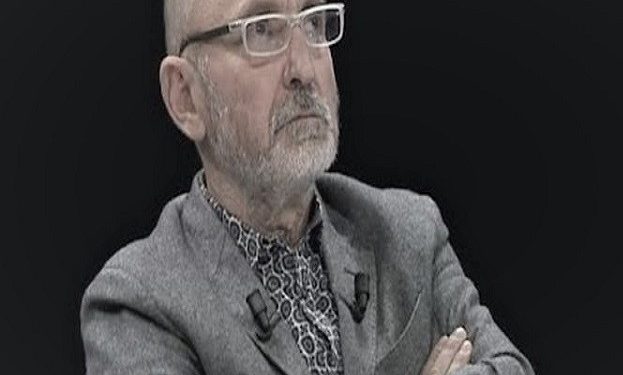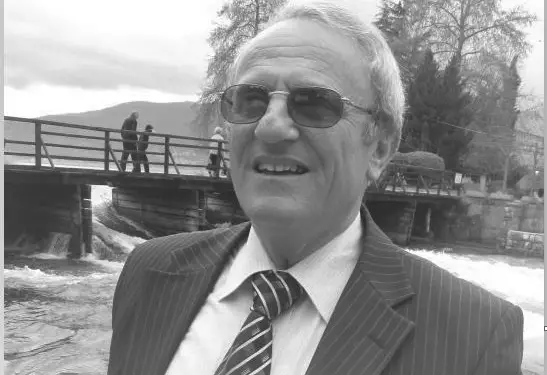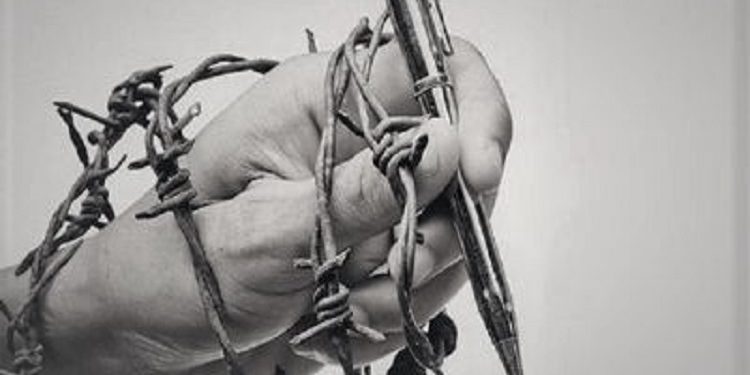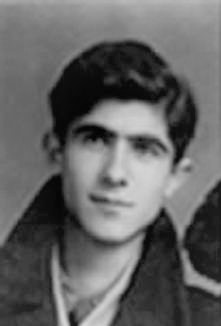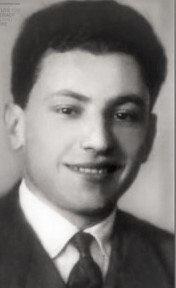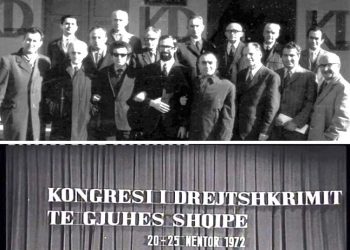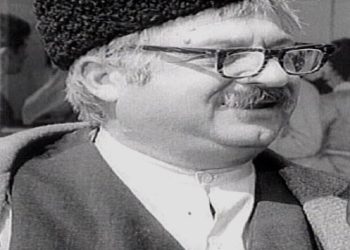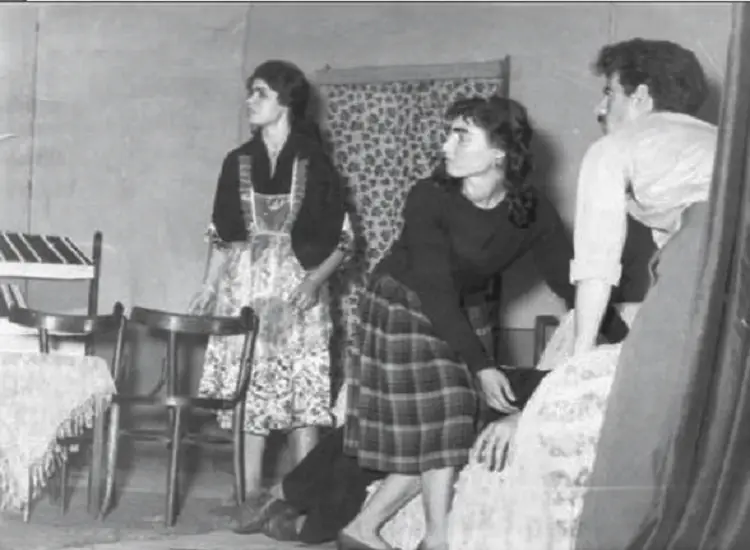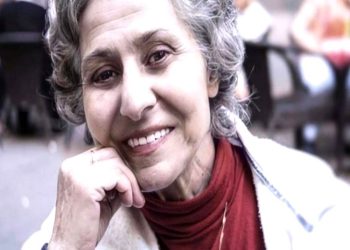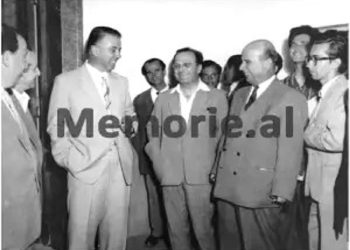From Shpendi Topollaj
Second part
Memorie.al / When the symbols of communism, after half a century of struggle, collapsed, there was such a loud noise that we woke up from our deep sleep. We opened our eyes, but not all of us believed what had happened: often, as a person sees some dreams that he takes for truth, he also sees some truths that he takes for dreams. Moreover, there were not a few who opposed this historic upheaval, with demonstrations and even threats. To overcome this situation, patience and wisdom were needed. We were brothers. As such, we had an intellectual, moral and spiritual duty to denounce the demagoguery of communism and the monstrous crimes of the red inquisition. Of course, the most reliable were those who had languished and suffered in prisons and exiles. Silence would really be a great sin of theirs…!
Continues from last issue
TRIBUTE TO THOSE WHO DARE TO FACE EVIL
– About the book “Rebirth” by Fatos Lubonja-
But the monster of monsters was Enver Hoxha, because being the ruler of a people and a small country; he also had the opportunity to personally know the wise, cultured, skilled, courageous and true democrats. The fate of Fatos Lubonja and his father is known, after the IV Plenum – of the Central Committee, but the author of “Ridënimi” does not speak for himself.
He uses his drama, physical and psychological sufferings only to show what happened to others, especially those who had understood long ago and fearlessly proclaimed Hygoi’s words that: The present belongs to the king, the future belongs to the people”. At first glance, the author deals with a staged judicial process.
Strange things happened in Albania: even those who were sentenced for a quarter of a century, as “enemies of the party” – the state, while serving their sentences in brutal prisons, again appeared before the jury, for the crime of agitation and propaganda, to was punished once again so. The dictator and the dictatorship lied to themselves, expecting that the political convicts would love them from the hell they had put them in, as a result of reading some unsavory works.
They were hardly that naive, but apparently, they wanted to terrify others. Models existed; so did Hitler, Stalin, etc. Enveri, who went to the bullet, without mercy, the members of the Political Bureau, he didn’t even want to know about the others, by the way, the journalists Fadil Kokomani and Vangjel Lezho.
But he forgot one important thing: that a man’s character had nothing to do with the powers he could hold. If the members of the Central Committee of the Politburo, of the PPS, ministers or generals, were to separate from the Commander, making deep self-criticisms, mostly for innocent faults and guaranteeing him endless loyalty to him , or asking for mercy like men, many simple people, with unimaginable courage, would know how to preserve their dignity, without fearing even death!
As much as we encounter in this book, when the chairman of the court session asks Fadil Kokomani: “Do you, the defendant, feel any remorse for what you have committed against the party and the government”?, this with a calmness that he did not have betrayed not a moment, during that whole session, he answered; “Of course not, as long as I did them consciously.”
The heroism of such people, Fatos Lubonja, has not heard or read. He was there, in the courtroom. In the attitude of Fadil and Vangjeli, he saw so much invincibility that he almost forgot himself. Fadili’s and Vangjeli’s apologies, in the prevailing climate, are among the rarest acts in the entire history of Albanian trials. For them, it is difficult to find an analogous case in all the countries of the Communist East.
Knowing well the bloody nature of the system, F. Lubonja deduces that; Fadil Kokomani was lecturing for the last time. He knew clearly what was expected of a man like him, when he firmly declared: – “I was and am against terror and against the blood that Stalin has shed and that has also been shed in Albania, by Enver Hoxha’s Stalinist policy… “!
It was as clear as the light of the sun and there was no questioning the end of the one who, with iron logic, irrefutable arguments and exemplary culture, denounced tyranny and presented his convictions, therefore the accused Fatos Lubonja hoped that he would die, the Gospel would save.
Fatos, being so apathetic to his fate, is more like a spectator of a great tragedy, where, wandering around the stage, he doesn’t even have time to think. This author’s narrative, on the one hand, resembles a novel, where he has placed two main characters in the foreground, who are so similar to each other. They challenge with their profiles, many others too.
They too have been carved with great care and attention, but nevertheless, they are the two who, rising above death, occupy a very important place, they are the two who raise for themselves a monument of a style, size and skill almost forgotten. It is for this reason that the author is presented as he is: a young rebel, but also that his life hurts, because in its name, he accepts and faces the challenge that is given to him. He does not have the experience of an old dissident, in the fight against tyranny, so even at the beginning of the arrest, like that recruit who is taken straight to the front, he manifests some signs of weakness.
This is justifiable, as long as he is portrayed as a militant of progress. And he becomes so aware that while he sincerely admires Fadil and Vangjeli, while he marvels at them, he feels pain for the further fate that awaits him, he resembles an analytical observer who has no direct connection with this process and, who knows at the same time to laugh at the scandals of the state and the evils of some co-sufferers or representatives of the so-called dictatorship of the proletariat.
Actually, he went to prison for a political accident, just because, for a political accident, his father was also imprisoned. However, there comes a moment when he declares: “I told these gentlemen judges, to express my opinion, that even though I am an opponent in terms of views with Fadil Kokomani, if he would remain alive, I would consider him my dearest friend” . This phrase alone is quite enough to elevate him to the height of the other two heroes.
Maybe it took this trial, for them to understand what ideals connected them, how much they loved each other, a love that comes out very clearly, in the careful observation of every gesture or, in the fixation of every word of Fadil and Vangjeli, on the part of the author of this book, with all the great trouble he had himself. In the easily imagined conditions of a trial of such magnitude, he “captures” so much detail that he reaches very interesting descriptions, such as: “When Vangjeli appeared before the jury, it was seen that he had ligated outside measure. Between the ironed skin of the face and the bones of the brick head, there was not a single thread of flesh left. You could clearly see all the bumps on his skull!
Then you could see the thin neck, a jacket whose lining was visible in two or three places, and the pants that looked like they had only two perches inside, ending with those black rubber straps. This appearance, combined with the thought that his death was almost certain, led you to think that he would, rather than speak, make some spooky sounds. Almost, as if I were surprised, when I heard him speak in a full voice and in a manner, which showed that he still preserved an unimpaired clearness of judgment.”
“Re-criminalization” is perhaps the most classic example in post-dictatorship literature, to see how they were assembled by evil professionals, followers of the school of Jagoda and Beria (compare with Enco Biax’s “Lubjanka”), a process where she was present everything, except the truth, the human spirit, the end of mercy, not that they ended with sacrifices like brothers or, endless imprisonment.
Fatos Lubonja also, with the patience and scrupulousness of a researcher, gives a valuable lesson in combining memories with archival documents. He, even if given the opportunity, knows how to avoid self-praise, knows how to present himself simply and modestly and by doing the curriculum of different people, he lets others evaluate him, how to judge for himself. For him, it is important to be frank, just like Haki Stërmilli in his “Prison”, without suggesting artificial respect to others and without thinking of waiting for decoration decrees.
For him, it is enough for everyone to know that he, in a very difficult moment, for his new life, in his last speech before the jury, declared: “I ask for my innocence… I also ask for Fadil, hoping that Vangjeli , he will have more life, the nobility of the strongest, against a dignified enemy”. In life, he was inclined towards literature, not politics, but apparently life forced him to deal with politics. And he, with his culture, managed to alternate them wonderfully.
In “Re-conviction”, the author does not moralize, nor does he label at will. He paints faithfully and it is not his fault if anyone is ugly. He finds no other name for the spy, the coward, the immoral and the intriguer, than the spy, the coward, the immoral and the intriguer, a name that everyone has written on their forehead.
As if the unjust sentence of several years and the constant fear of the dungeon where the cold reached -20 degrees, but you had to be guarded every day from all kinds of evil provocateurs, from sadistic policemen, from so-called spies; “dungeon rats” and from people who, although they had never exchanged two words, again, appeared in court, with the greatest ease, as false witnesses.
Here’s how the author describes one: “Those wrinkles on his face seemed to bend and twist in harmony with the bending and twisting of his whole body and the intonation of his voice, and from time to time, when the judge intervened, his face rose into a servile grimace . All this appearance, made that 65-year-old old man, so fake and disgusting, that it seemed to me that his appearance alone was enough to prove that he was slandering”! They were so impersonal that they were often not even worth dealing with.
Fatos Lubonja, for one, writes: “It seemed absurd to even defend yourself against him! In that parade of insolence, he brought out more, its comic side, so much so that you were ready to think that all this work would end with a big laugh”! Spies were so widespread in the camp that even among this kennel there was room for differentiation and individuality. Here’s what it says about one: “Doda, he was the most charming of all the spies in the camp.”
Dealing with the fight, between good and evil, for that part that he experienced himself, Fatos Lubonja, as the hottest point of this match, has chosen the courtroom. Here, not only has everyone taken their own position, but they have finally removed their mask. Here, before the greatness of Fadil, Vangjeli, Fatos, etc. even the prosecutor’s accusations and pretensions or the interventions and questions of the chairman of the session seem miserable, frequent and ridiculous.
The apology of the main accused is an unrepeatable example to see how far human dignity can be elevated, when courage and conviction are united in one with intelligence, high culture and eloquence. We don’t know another case, where a man on the verge of death has shone so magnificently, like Fadili! He confused the jury and the whole hall; he disarmed and turned the prosecutor into a coward and ignorant.
Of course, the punishment was determined, as it was for Christ, Giordano Bruno, and Nicolas Copernicus. Fadili and his friends knew that death was nowhere before that presentation, before an inquisition trial of historic proportions. Therefore, the author notes after the sentencing: “To my surprise, Fadili had a very bright face, freed from the tensions and nightmares of death…! It seemed to me as if between the gates of the eyes, he wanted to pour his very life, inside me”!
And we are convinced that such heroes, with their selfless struggle for freedom and justice, from the pages of this book, both historical and artistic, will forever pour their lives not only into the eyes of every reader, but even at the gates of their hearts, raising the hope that in the match of evil with good, good will triumph. Memorie.al
The next issue follows




